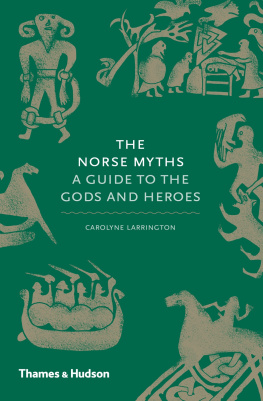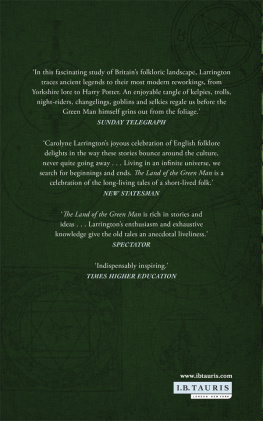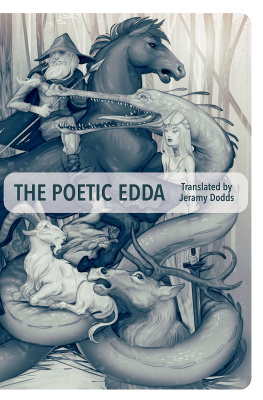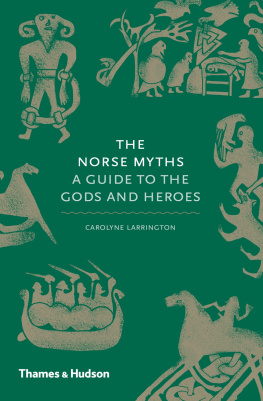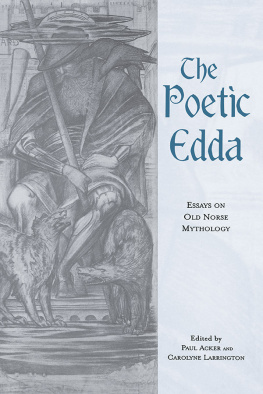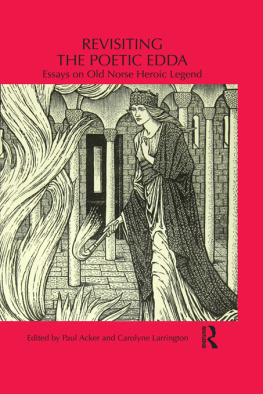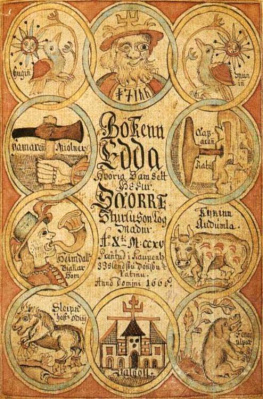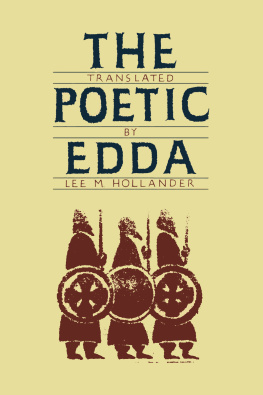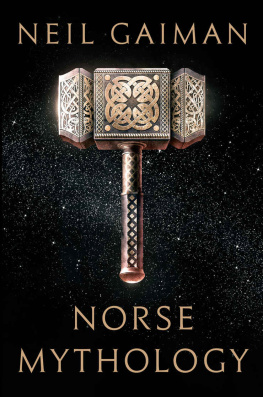OXFORD WORLDS CLASSICS
THE POETIC EDDA
THE collection of NorseIcelandic mythological and heroic poetry known as the Poetic Edda contains the great narratives of the creation of the world and the coming of Ragnarok, the Doom of the Gods. The mythological poems explore the wisdom of the gods and giants and narrate the adventures of the god Thor against the hostile giants and the gods rivalries amongst themselves. The heroic poems trace the exploits of the hero Helgi and his valkyrie bride, the tragic tale of Sigurd and Brynhilds doomed love, and the terrible drama of Gudrun, daughter of Giuki, Sigurds widow, and her children. Most of the poems exist in a single manuscript written in Iceland around 1270, but many of them pre-date the conversion of Scandinavia to Christianity and allow us to glimpse the pagan beliefs of the North.
CAROLYNE LARRINGTON is a Fellow and Tutor in medieval English at St Johns College, Oxford. She co-edited The Poetic Edda: Essays on the Mythological Poetry (2002) with Professor Paul Acker of the University of St Louis, and now the follow-up volume Revisiting the Poetic Edda: Essays on Old Norse Heroic Legend (2013). She is the author of more than twenty articles on Old Norse literature, a book: A Store of Common Sense: Gnomic Themes and Styles in Old Icelandic and Old English Wisdom Poetry (1993), and she also co-edited the neo-eddic poem Slarlj for the Skaldic Poetry of the Scandinavian Middle Ages series. With Judy Quinn she founded the Eddic Research Network and is a member of its Steering Group.
OXFORD WORLDS CLASSICS
For over 100 years Oxford Worlds Classics have brought
readers closer to the worlds great literature. Now with over 700
titlesfrom the 4,000-year-old myths of Mesopotamia to the
twentieth centurys greatest novelsthe series makes available
lesser-known as well as celebrated writing.
The pocket-sized hardbacks of the early years contained
introductions by Virginia Woolf, T. S. Eliot, Graham Greene,
and other literary figures which enriched the experience of reading.
Today the series is recognized for its fine scholarship and
reliability in texts that span world literature, drama and poetry,
religion, philosophy, and politics. Each edition includes perceptive
commentary and essential background information to meet the
changing needs of readers.
Refer to the to navigate through the material in this Oxford Worlds Classics ebook. Use the asterisks (*) throughout the text to access the hyperlinked Explanatory Notes.
The Poetic Edda
OXFORD WORLDS CLASSICS
Translated with an Introduction and Notes by
CAROLYNE LARRINGTON
REVISED EDITION


Great Clarendon Street, Oxford, OX2 6DP,
United Kingdom
Oxford University Press is a department of the University of Oxford.
It furthers the Universitys objective of excellence in research, scholarship, and education by publishing worldwide. Oxford is a registered trade mark of Oxford University Press in the UK and in certain other countries
Carolyne Larrington 1996, 2014
The moral rights of the author have been asserted
First published as a Worlds Classics paperback 1996
Reissued as an Oxford Worlds Classics paperback 1999, 2008
Revised edition 2014
Impression: 1
All rights reserved. No part of this publication may be reproduced, stored in a retrieval system, or transmitted, in any form or by any means, without the prior permission in writing of Oxford University Press, or as expressly permitted by law, by licence or under terms agreed with the appropriate reprographics rights organization. Enquiries concerning reproduction outside the scope of the above should be sent to the Rights Department, Oxford University Press, at the address above
You must not circulate this work in any other form and you must impose this same condition on any acquirer
Published in the United States of America by Oxford University Press
198 Madison Avenue, New York, NY 10016, United States of America
British Library Cataloguing in Publication Data
Data available
Library of Congress Control Number: 2013956086
ISBN 9780199675340
Printed in Great Britain by
clays Ltd, St Ives plc
Links to third party websites are provided by Oxford in good faith and for information only. Oxford disclaims any responsibility for the materials contained in any third party website referenced in this work.
ACKNOWLEDGEMENTS
My first debt of gratitude is owed to the late Ursula Dronke, an inspirational teacher and scholar who first taught me Old Norse and introduced me to the poetry of the Edda; her own edition of the Poetic Edda is inspirational. Every scholar of the Edda owes a great debt to Anthony Faulkes, whose model translation of the Snorra Edda has been constantly at my elbow. Margaret Clunies Ross, Britt-Mari Nsstrm, Matthew Driscoll, Andrew Wawn, Paul Acker, Judy Quinn, and Beatrice La Farge all contributed in one way or another to the interpretations in the original volume.
In the almost twenty years since the first edition of this translation was published, eddic scholarship has blossomed. Klaus von See, Beatrice La Farge, Katja Schulz, and their colleagues at the Johann-Wolfgang-Goethe University in Frankfurt-am-Main are bringing to completion the multi-volume Kommentar zu den Liedern der Edda, a series which has shed new light on the history and complexity of eddic poetry, and which has been invaluable in my work on this new edition. Special thanks must go to Beatrice La Farge for sharing still unpublished material with me and to Peter Robinson who kindly supplied me with a PDF of his Svipdagsml edition. Hannah Burrows (and the General Editors of the Skaldic Poetry of the Middle Ages) generously gave permission to use Hannahs edition of The Waking of Angantyr. All the scholars mentioned above have of course continued to shape my thinking about eddic poetry; to them should be added a lively and inspiring younger generation of Norse scholars: David Clark, Brittany Schorn, Jhanna Katrn Fririksdttir, Hannah Burrows, Tom Birkett, and Michael Hart. Judith Jesch and Heather ODonoghue have, as ever, offered encouragement. The Stofnun rna Magnssonar in Iceland welcomed me to work on the final stages of this revision; and I owe colleagues and friends there, in particular its director Gurn Nordal, a longstanding debt of thanks. And grateful thanks go to Ragnheiur Msesdttir and Matthew Driscoll for their hospitality in Reykjavik.
With Judy Quinn in particular, co-founder of the Eddic Network, I have shared eddic conversation for many years, and I owe more than I can express to her readiness to talk about eddic interests, and to her friendship.
FOR JOHN, AGAIN
CONTENTS
THE old, one-eyed god Odin hangs nine days and nights on the windswept ash-tree Yggdrasill, sacrificing himself to himself; the red-bearded Thor swings his powerful hammer against the giant enemy; the ravening wolf Fenrir leaps forward to seize the Father of the Gods in his slavering jaws; the terrible passion of Brynhild for the dragon-slayer hero Sigurd culminates in her implacable demand for his murderall these famous scenes from Old Norse myth and legend are vividly staged in the Poetic Edda. From the creation of the world out of the yawning void of Ginnungagap to the destruction of the gods in the mighty conflagration of Ragnarok, the poetry of the
Next page

